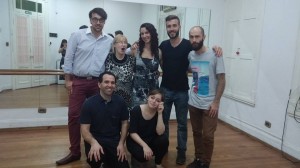 |
| Hablás español? |
Since arriving, my ears have definitely become more attuned to the porteño vocalics and my mouth more accustomed to pronouncing words with a rioplatense accent, peppered with Buenos Aires vocabulary. I know I still wouldn't be mistaken for a native speaker, by no means, but it's been an invigorating feeling navigating daily life in a different language and feeling confident and competent to express myself, in both small talk and more intricate topics. In the States, I study linguistics as a major, with a minor in Spanish, so I try to remain aware of language nuances as they happen around me and adjust my own speech accordingly. It's the perfect challenge for a language lover.
Here are some of the things I've picked up during the first half of my semester here:
The most salient aspect of Buenos Aires Spanish is the pronunciation of the 'y' phoneme as a 'sh' or 'zh' sound. Thus, a phrase like 'Yo me llamo Yolanda' (My name is Yolanda) would be pronounced like 'Sho me shamo Sholanda.'
Also very typical and easily recognizable is the use of 'voseo,' a separate informal way to conjugate the second person in the present. This is used in place of 'tú,' and is a common term of address in many situations, reflecting the informal environment of Buenos Aires Spanish. A few sample conjugations:
-Hablar (to speak)
yo hablo
tú hablas/ vos hablás
él habla
nosotros hablamos
ellos hablan
Tener (to have)
yo tengo
tú tienes / vos tenés
él tiene
nosotros tenemos
ellos tienen
The difference will make more sense if you already know a basic bit of Spanish grammar. The vos form engenders a change in stress, indicated by the accent on the ultimate syllable of the word. It also neutralize the stem change in verbs such as tener, pensar, dormir, and pedir.
Porteños are also very fond of their ubiquitous 'che,' which can be used as an interjection to call attention like 'hey,' or also as a casual term of endearment tagged at the end of a phrase, like dude. You can also refer to a dude or guy/gal with 'chico/a', 'pibe/a', or 'tipo/a'.
A few other local phrases/vocab tidbits I find myself using using most often in casual conversation:
- 'Viste' - literally 'you saw/did you see?' but used to say 'do you know about/ do you follow me?'
- 'Lindo/a' - I hear this word all over the place, to refer to a really cool experience/place or a beautiful person. (I also made the mistake that I cannot, as a male, call another male 'lindo', attempting to say he's cool - I will be saying I'm attracted to him.)
- La onda/buena onda - An 'onda' is literally a wave but refers to the vibe of something. 'Buena onda' is used to say something is cool, a good vibe. I hardly ever hear 'chevre' or 'guay' to describe something as cool - it's buena onda.
- Qué me decís? - Literally 'What are you saying to me' , used like 'what are you talking about?'
- En serio?? - Really??
Overall, the takeaway is that to become more like a native speaker, spend time with native speakers! I definitely value the academic language training and now I'm striving to cap it off with immersive experience. The great part is the people of Buenos Aires are very friendly and talkative and there are plenty of opportunities for language exchange! Muy buena onda :)
 |
| Making new friends in a new language! |
Maximilian Mohr is the Spring 2015 CEA MOJO in Buenos Aires, Argentina. He is currently a junior at the College of William and Mary.










